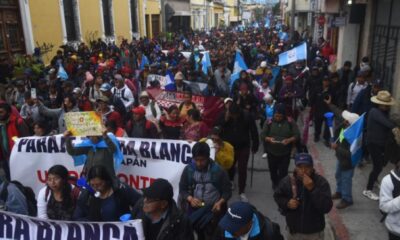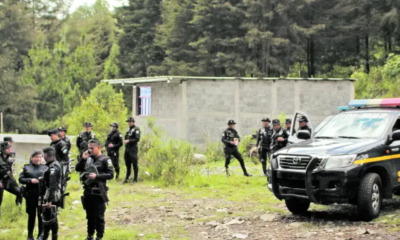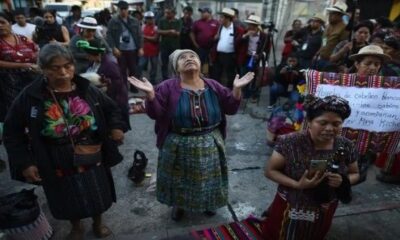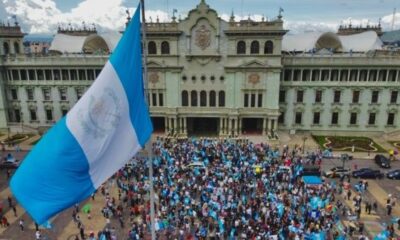Central America
The situation of Guatemalan journalists exiled in the last four years is “very critical”
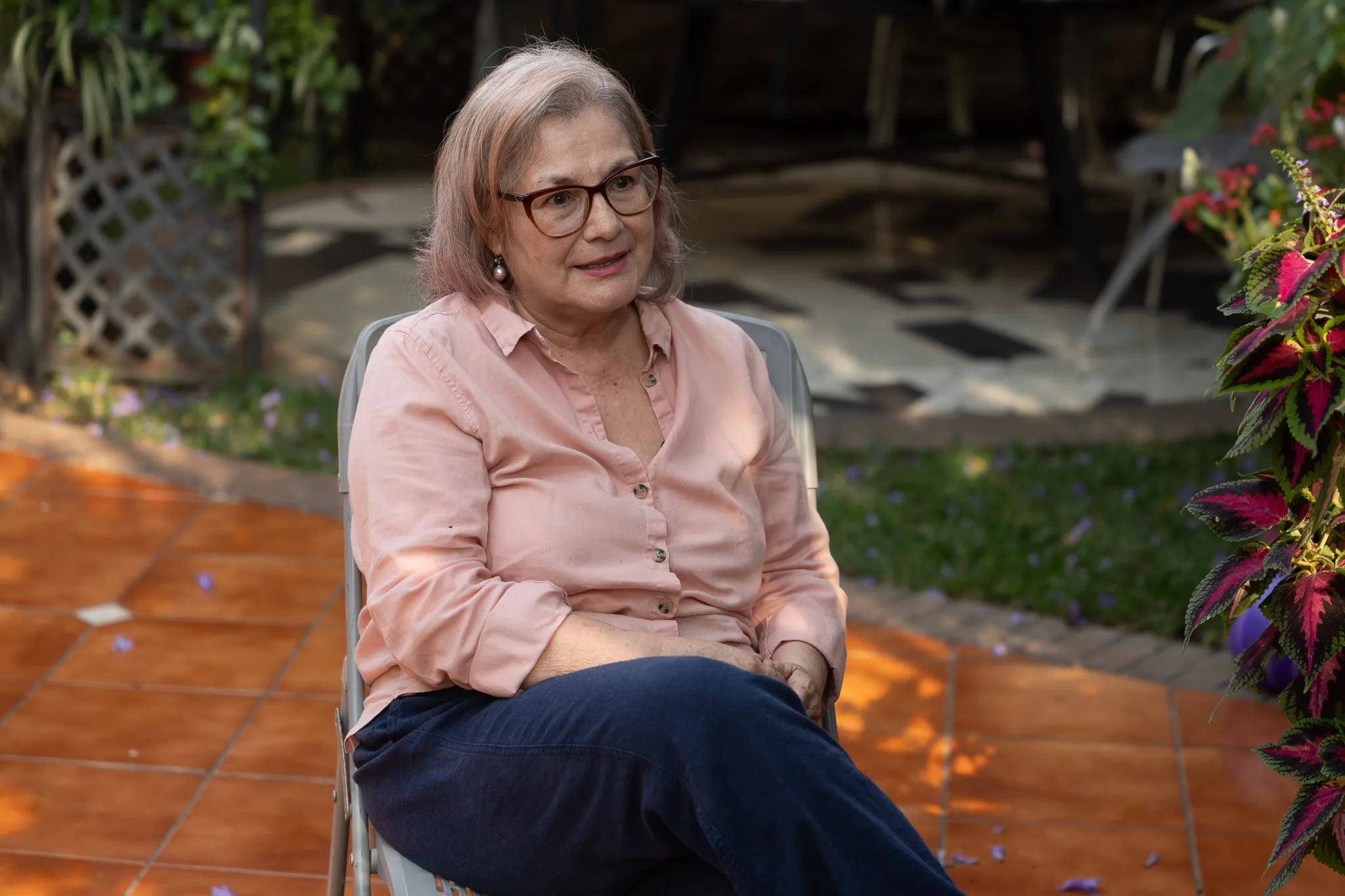
Journalist and defender of freedom of expression Evelyn Blanck warns that the reporters who have been forced to leave Guatemala are in a “very critical” situation and that there are still no conditions for them to return to the country, despite the positive turn in the press that has been given with the Government of the new President Bernardo Arévalo de León.
Blanck is the coordinator of the Civitas Center, an organization that seeks to ensure the freedom of the press in the Central American country and that has coordinated support for more than twenty journalists who have had to go into exile, after denouncing political persecution against her in the last four years.
“Colleagues in exile are in a critical situation,” the journalist warns in an interview with EFE and assures that among the twenty colleagues who were forced to leave Guatemala in recent years, there are three mothers who are separated from their children and many others who struggle to find conditions to continue practicing journalism.
Several of them “are struggling to survive because they came out with emergency funds, with financing for three months and they never have anything guaranteed,” says this journalist with more than 30 years of experience.
According to an analysis by the social organization Red Rompe El Silencio, 44% of Guatemalan journalists exiled have had to stop exercising their profession and most are refugees in the United States, Mexico, Costa Rica and seven other countries.
This crisis of “political persecution” against the press in several Central American countries revealed that there is no comprehensive system of care for journalists who are forced to leave their country, says the activist.
“The only thing we have left is to try to work with the Central American network of journalism solutions so that colleagues have conditions to stay outside because today Guatemalans, Salvadorans and Nicaraguan exiles cannot return,” Blanck concludes.
Journalists Juan Luis Font, director of the radio program Con Criterio and Michelle Mendoza, who was a correspondent for the CNN network in Guatemala, top the list of Guatemalan communicators who have had to go into exile.
In Blanck’s opinion, the Government of the new president of Guatemala exhibits “an institutional discourse that recognizes the work of the press, although its ability to maneuver is very little because the State is still co-opted.”
“Of course there is tension, but it is different from the administrations of Alejandro Giammattei (2020-2024) and Jimmy Morales (2016-2020), where there was an absolute public contempt for the press and that is over,” says the journalist.
According to the Association of Journalists of Guatemala (APG), during the administration of Giammattei there were more than 400 attacks on the press by public officials, and the vast majority of these were dismissed and not investigated by the authorities.
That is why Blanck refers to the Government of Arévalo de León as “a respite that we do not know how long it will last,” and warns that there are no conditions for journalists who left the country under persecution to return while the co-optation of the Judicial Body and the Public Ministry (Public Prosecutor’s Office) persists.
“Doing journalism in Guatemala has always been facing a country of censorship, it is facing power. This is one of the most difficult countries to do quality journalism,” says Blanck.
The Guatemalan Prosecutor’s Office, headed by Consuelo Porras Argueta, has led several cases against communicators in recent years and the most emblematic is that of José Rubén Zamora Marroquín, an internationally recognized journalist who was arrested on July 29, 2022, a few days after launching criticism against the close circle of the then president, Alejandro Giammattei.
Zamora Marroquín, who recently served 600 days in prison, is still waiting for the repetition of the trial against him for an alleged money laundering case and indicated that since the arrival of Arévalo de León to power in January, he has been guaranteed decent conditions in his arrest.
Central America
Guatemala President Says Starlink Terminal Found Inside Prison

Guatemalan President Bernardo Arévalo revealed on Tuesday that a Starlink terminal was discovered inside a prison in the country, highlighting corruption and the illegal introduction of advanced communication technology into the penitentiary system.
Arévalo did not specify which prison the device was found in but stressed that Starlink’s ability to connect directly to low-orbit satellites makes it particularly difficult to disrupt, posing a serious security risk.
The disclosure was made during a press conference attended by Interior Minister Marco Antonio Villeda and Defense Minister Henry Sáenz.
On January 6, specialized units of Guatemala’s National Civil Police (PNC), members of the Army and prison security personnel carried out Operation Sentinel at the Renovación 1 Maximum Security Prison for Men, located in Escuintla. According to the Interior Ministry, the operation aimed to reduce criminal activity, prevent illicit acts and stop the trafficking of prohibited items inside the prison.
During the operation, authorities also dismantled businesses operating near several prisons after detecting routers that were allegedly used to redirect internet signals into penitentiary facilities, according to local outlet Emisoras Unidas.
Tensions escalated further over the weekend of January 17 and 18, when inmates affiliated with gangs staged riots in three prisons. During the unrest, they took prison guards and a psychologist hostage, demanding extra-large beds, air conditioning, transfers to other facilities and access to the internet.
Central America
Guatemala Police Arrest Prison Guard Caught in the Act of Extortion
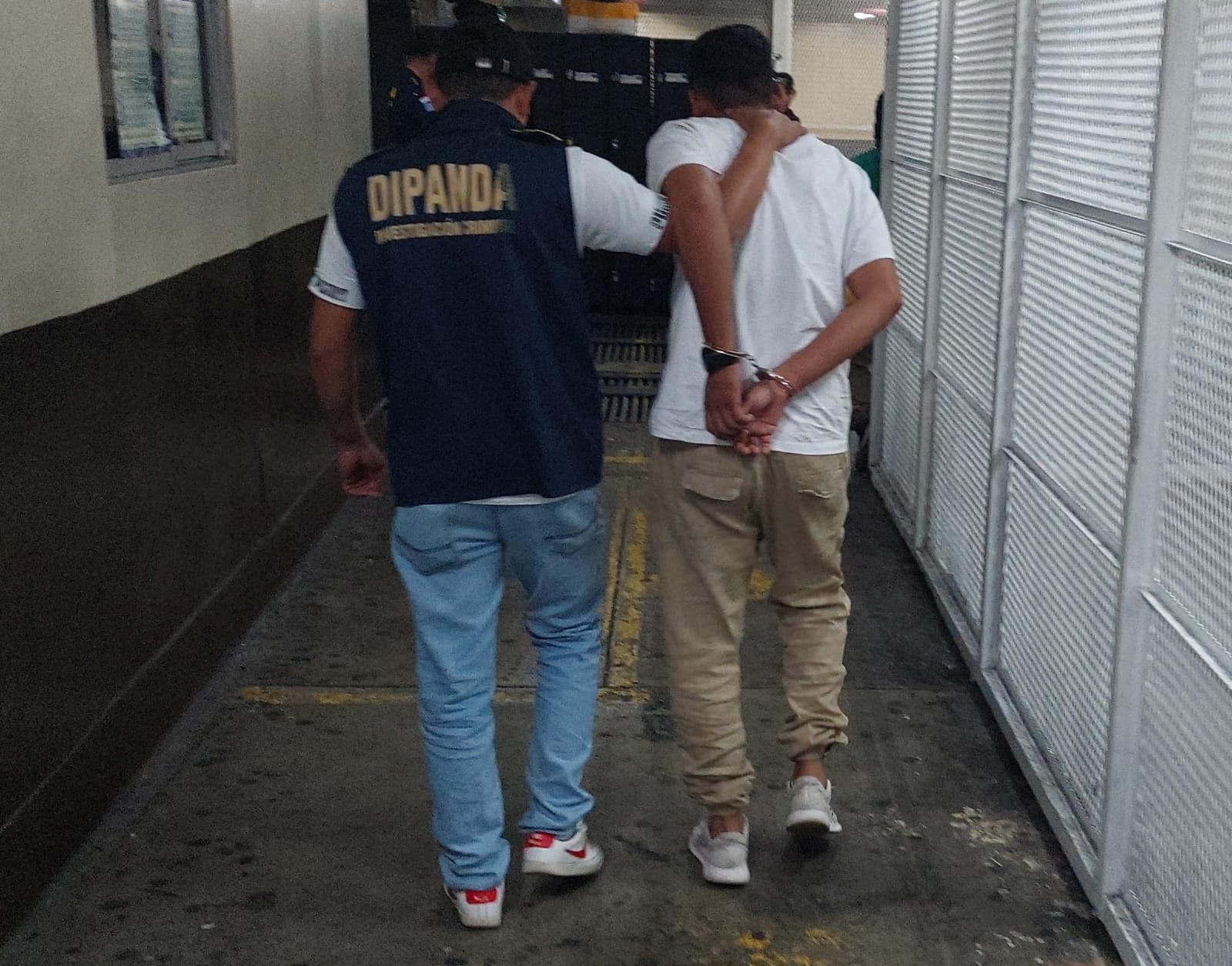
Guatemala’s National Civil Police (PNC) arrested a suspected extortionist in the act during an operation carried out in the department of Quiché, authorities reported.
According to the police report, the arrest took place in Zone 1 of Santa Cruz del Quiché after officers responded to a citizen complaint. Agents from Precinct 71 identified the suspect as Encarnación “N”, 41, who was serving as a guard in the Guatemalan Penitentiary System.
The suspect was caught while attempting to collect a package simulating an extortion payment totaling 25,000 quetzales. Police intervened at the precise moment the money was being handed over, allowing authorities to document the crime in flagrante delicto.
Following the operation, the detainee was placed at the disposal of the competent courts to face criminal proceedings.
The PNC emphasized that such operations aim to dismantle criminal structures involved in extortion, regardless of whether those implicated are linked to state institutions, and urged the public to continue reporting these crimes through confidential channels.
Central America
Honduras swears in conservative president Asfura after disputed election

Conservative politician Nasry Asfura assumed the presidency of Honduras on Tuesday with an agenda closely aligned with the United States, a shift that could strain the country’s relationship with China as he seeks to confront the economic and security challenges facing the poorest and most violent nation in Central America.
Asfura’s rise to power, backed by U.S. President Donald Trump, marks the end of four years of left-wing rule and secures Trump another regional ally amid the advance of conservative governments in Chile, Bolivia, Peru, and Argentina.
The 67-year-old former mayor and construction businessman was sworn in during an austere ceremony at the National Congress, following a tightly contested election marred by opposition allegations of fraud and Trump’s threat to cut U.S. aid if his preferred candidate did not prevail.
Grateful for Washington’s support, Asfura—who is of Palestinian descent—traveled to the United States to meet with Secretary of State Marco Rubio, before visiting Israeli Prime Minister Benjamin Netanyahu.
“We need to strengthen relations with our most important trading partner,” Asfura said after being declared the winner of the November 30 election by a narrow margin, following a tense vote count that lasted just over three weeks.
-

 Central America2 days ago
Central America2 days agoGuatemala seizes over a ton of cocaine hidden in flour at Pacific port
-

 International4 days ago
International4 days agoTrump-Era Defense Plan Prioritizes Border Security and Scales Back Global Commitments
-

 International4 days ago
International4 days agoBogotá and Quito Seek Dialogue After Tariffs and Power Cut Escalate Tensions
-

 International3 days ago
International3 days agoDelcy Rodríguez seeks political agreements after Maduro’s ouster
-

 International2 days ago
International2 days agoSpain’s irregular migrant population rises to 840,000, study finds
-

 International2 days ago
International2 days agoHistoric snowstorm paralyzes Toronto after 60 centimeters of snow
-

 International3 days ago
International3 days agoFederal immigration agents kill man in Minneapolis, sparking protests and outrage
-

 Central America1 day ago
Central America1 day agoGuatemala Police Arrest Prison Guard Caught in the Act of Extortion
-

 Central America1 day ago
Central America1 day agoHonduras swears in conservative president Asfura after disputed election
-

 Central America1 day ago
Central America1 day agoBukele leads public trust rankings as UCA survey highlights gains in security
-

 International1 day ago
International1 day agoDoomsday clock moves to 85 seconds before midnight amid rising global risks
-

 International1 day ago
International1 day agoWinter Storm Fern Leaves 30 Dead and Over One Million Without Power Across the U.S.
-

 Sin categoría1 day ago
Sin categoría1 day agoEight Killed in Series of Armed Attacks in Ecuador’s Manabí Province
-

 International2 days ago
International2 days agoRights group says nearly 6,000 killed in Iran protest crackdown
-

 International1 day ago
International1 day agoSpain approves plan to regularize up to 500,000 migrants in Historic Shift
-

 International2 days ago
International2 days agoVenezuela frees at least 80 political prisoners, NGO says
-

 Sin categoría1 day ago
Sin categoría1 day agoEl Salvador Launches Fourth Year of Ocean Mission to Protect Marine Ecosystems
-

 International2 days ago
International2 days agoEU launches new probe into X over AI-generated fake nude images
-

 International2 days ago
International2 days agoSevere winter storm grips U.S., leaves multiple dead as extreme cold persists
-

 International2 days ago
International2 days agoFrance debates ban on social media for children under 15
-

 International9 minutes ago
International9 minutes agoMissing Spanish Sailor Rescued After 11 Days Adrift in Mediterranean
-

 International6 minutes ago
International6 minutes agoFootball Fan Killed in Clashes After Colombian League Match
-

 International13 minutes ago
International13 minutes agoRubio Says U.S. Could Participate in Follow-Up Russia-Ukraine Talks
-

 Central America3 minutes ago
Central America3 minutes agoGuatemala President Says Starlink Terminal Found Inside Prison













































































